Tree Service Forest City
Find top Tree Service Company in Forest City
Receive up to 3 Tree Care Company quotes for your project today! Compare profiles, reviews, accreditations, portfolio, etc... and choose the best offer.
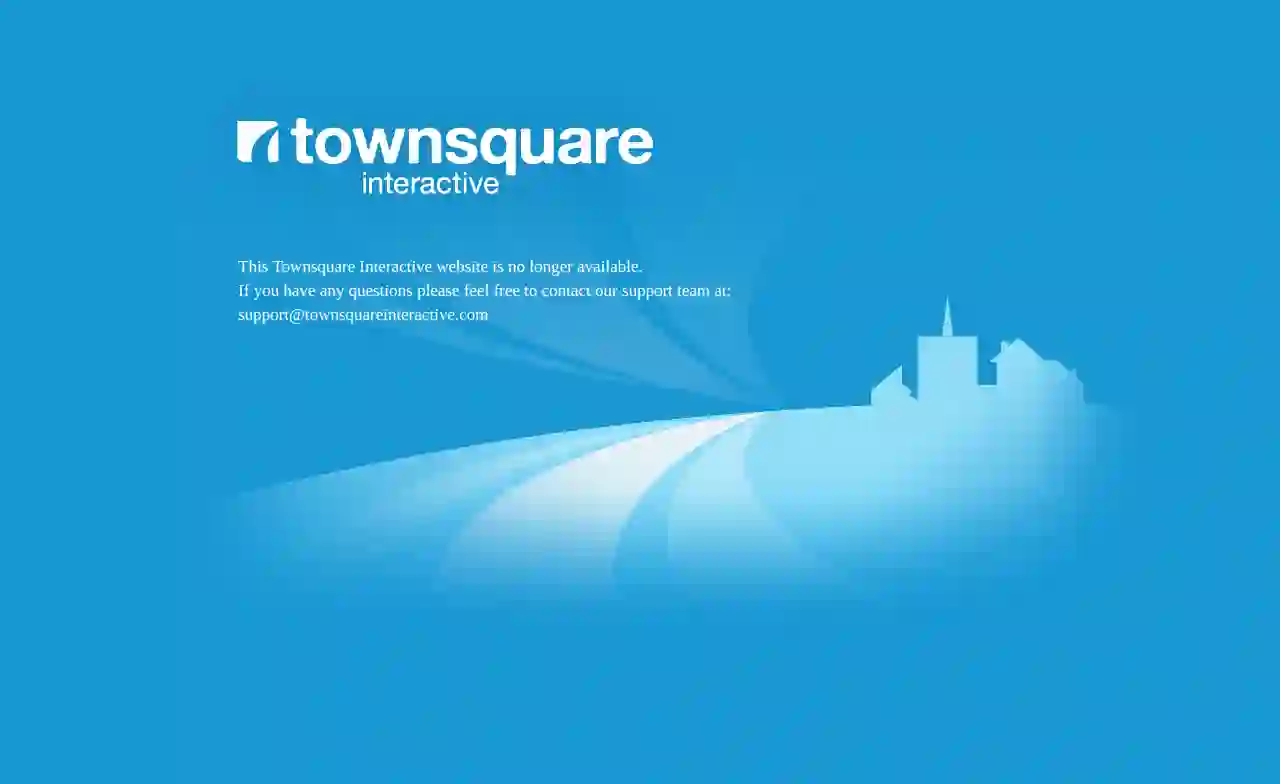
Central Iowa Tree Service and Land Improvement
Des Moines, 123 Main St, 50309, USAt Central Iowa Tree Service, we pride ourselves on providing top-notch tree care services to residential and commercial properties in Central Iowa. Our team of certified arborists and experienced tree care professionals are dedicated to delivering exceptional results, ensuring the health and beauty of your trees for years to come. We offer a wide range of services, including tree pruning, removal, planting, and maintenance. Our goal is to provide you with a safe and healthy tree canopy that enhances your property's aesthetic appeal and increases its value. Our commitment to quality and customer satisfaction has earned us a reputation as one of the most trusted and respected tree care companies in Central Iowa. We look forward to serving you and helping you achieve your tree care goals.
- Services
- Why Us?
- Accreditations
- Our Team
- Testimonials
Get Quote
Kutsch's Tree Service
4.316 reviewsDurango, IA, 15665 Hollow Ridge Lane, Dubuque, 52002, USAt Kutsch Tree Service, we’re your local tree care experts serving the beautiful Dubuque area and a 30-mile radius around it. With a passion for preserving the natural beauty of your property and ensuring your safety, we offer a comprehensive range of tree services to meet all your needs.
- Services
- Why Us?
- Accreditations
- Our Team
- Testimonials
- Gallery
Get Quote
XTreme Tree Inc
4.780 reviewsXTREME TREE Inc, De Soto, IA, 36656 N Ave, 50069, USXTREME TREE is a Des Moines-based tree service company that offers a variety of services including tree removal, tree trimming, stump grinding, and tree planting. With over 40 years of combined experience, the company's arborists are licensed, bonded, and insured to provide professional tree care services in the greater Des Moines area. XTREME TREE specializes in the removal of hazardous trees and also provides tree preservation services such as root pruning, crown pruning, fertilization programs, disease treatments, and pest control treatments. The company serves various areas including Des Moines, West Des Moines, Adel, DeSoto, Urbandale, Earlham, Winterset, Dallas Center, Clive, Johnston, Waukee, Grimes, Van Meter, Stuart, Minburn, and Perry.
- Services
- Why Us?
- Accreditations
- Gallery
Get Quote
Olson Tree Care
544 reviewsDes Moines, IA, 50266, USOlson Tree Care is a Local Small Business that employs research-based practices, revolving around the latest techniques in Arboriculture. ISA Board Certified Arboriculturist Chris Olson is the Arborist Des Moines calls upon possessing a First Class Education, high Visual Perception IQ and outstanding reputation in Arboriculture.
- Services
- Why Us?
- Accreditations
- Our Team
- Testimonials
- Gallery
Get Quote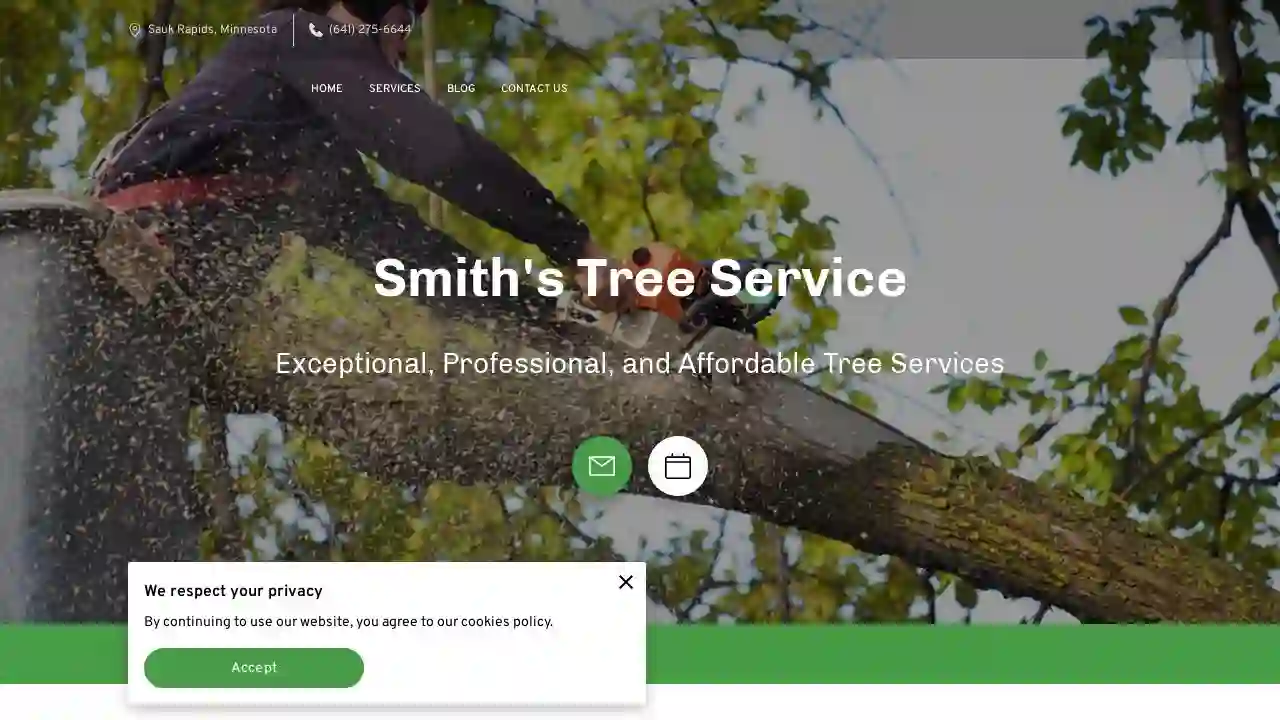
Smith's Tree Service LLC
52 reviewsSmith's Tree Service LLC, Sauk Rapids, MN, USSmith's Tree Service LLC is a family-owned business dedicated to providing exceptional tree care services in Sauk Rapids, Minnesota, and beyond. They offer a range of services including tree removal, tree pruning, stump grinding, and 24-hour emergency dispatch. Their team is skilled, compassionate, and committed to serving the community.
- Services
- Why Us?
- Accreditations
Get Quote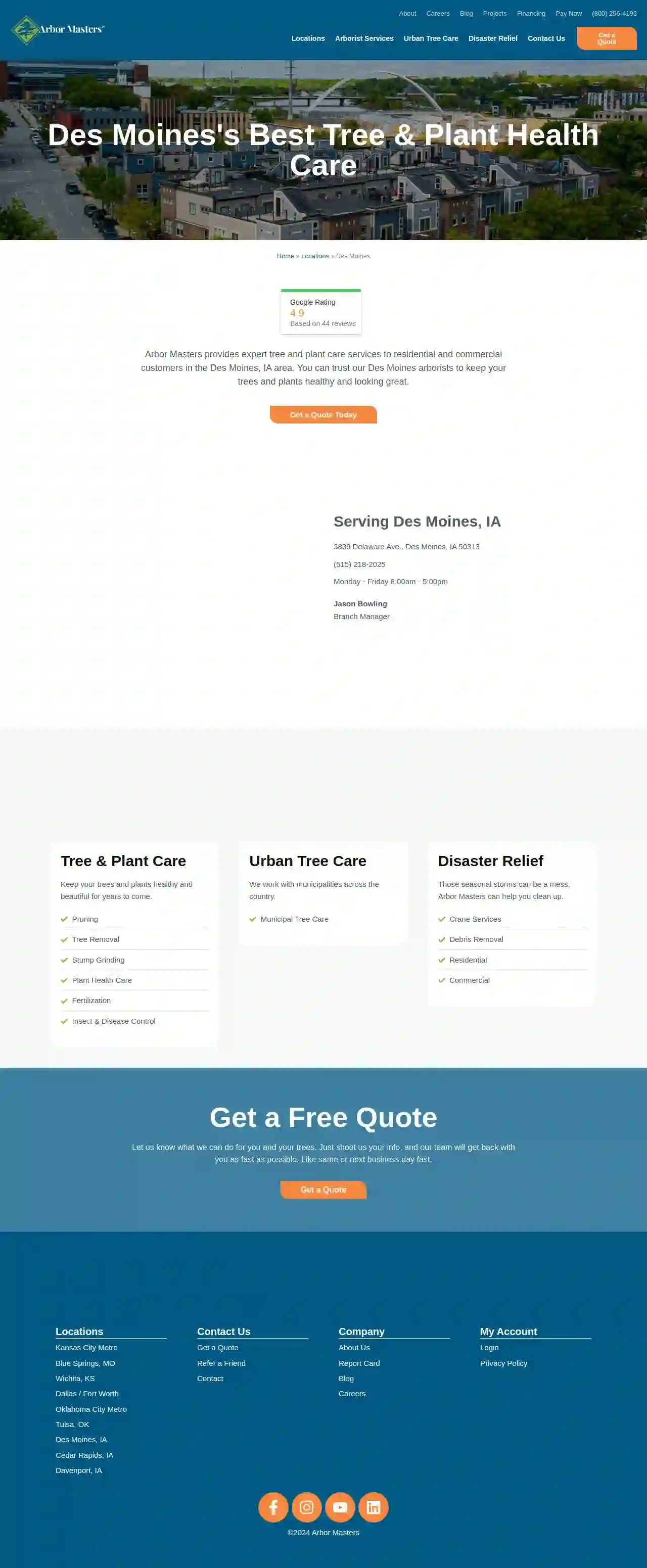
Arbor Masters of Des Moines
4.938 reviewsShawnee, KS, 8250 Cole Parkway, 64118, USArbor Masters is a leading provider of tree and plant health care services, offering a wide range of services including pruning, tree removal, stump grinding, plant health care, fertilization, insect and disease control, cabling and bracing, urban tree care, and disaster relief. With locations in Cedar Rapids, IA, Dallas & Fort Worth, Davenport, IA, Des Moines, IA, Kansas City, Oklahoma City, OK, Tulsa, OK, and Wichita, KS, Arbor Masters is dedicated to providing top-quality services to its customers.
- Services
- Why Us?
- Accreditations
- Our Team
- Testimonials
- Gallery
Get Quote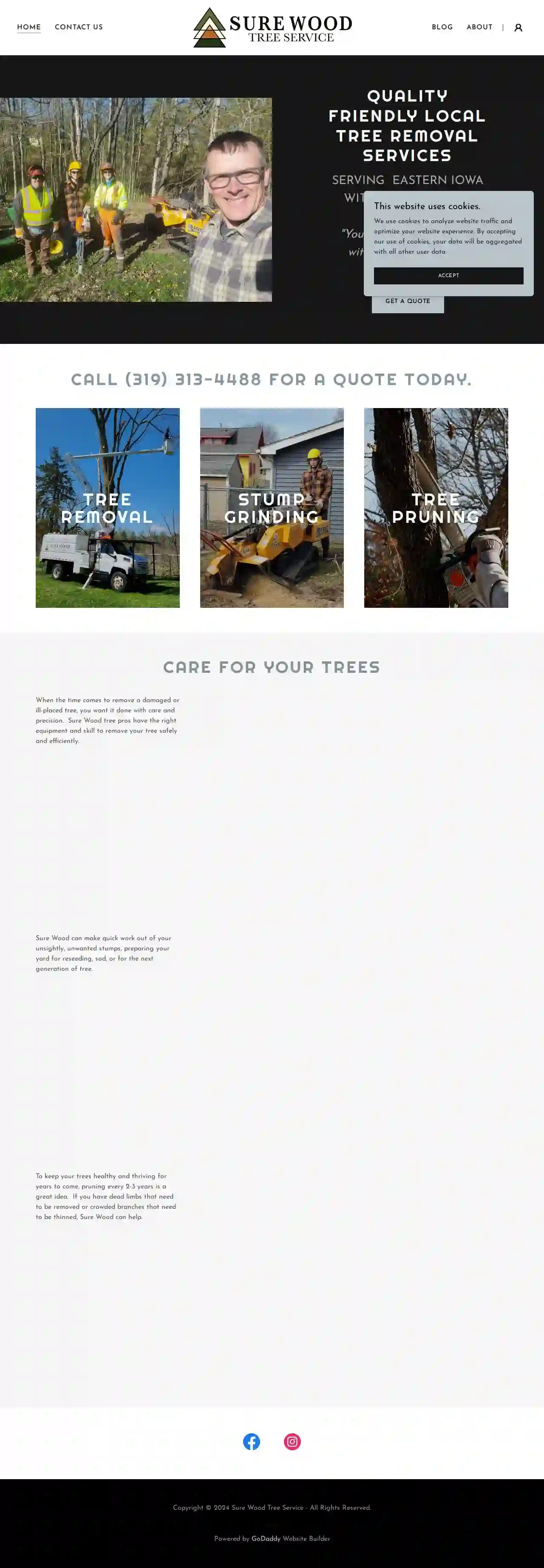
Sure Wood Tree Service
524 reviews4499 Boy Scout Road, Central City, 52214, USSure Wood Tree Service is a local business that provides quality friendly local tree removal services. They offer tree removal, stump grinding, and tree pruning services. The team consists of Jeremy Bushlack, Bryan Fentress, Jacob Bran, Simon Finley, and Robert Dunham. They aim to provide excellent customer service and ensure customer satisfaction.
- Services
- Why Us?
- Accreditations
- Our Team
- Gallery
Get Quote- So
Southern Iowa Tree Toppers
Suite 100, 123 Main St, Cityville, 12345, USOur company is dedicated to providing top-quality services to our clients. With a team of experienced professionals, we aim to deliver exceptional results that meet and exceed our clients' expectations. Our mission is to build long-lasting relationships with our clients by offering them the best possible solutions for their needs.
- Services
- Why Us?
- Accreditations
- Our Team
- Testimonials
- Gallery
Get Quote 
The Tree Doctor
4.454 reviews6319 Oakwood Dr, Urbandale, 50322, USThe Tree Doctor is a full-service outdoor tree care company in Des Moines, Iowa. We pride ourselves on three core values: professionalism, affordability, and timeliness. We go about business as we would want our own work done. We realize that today’s society is very fast paced. When people call our company for help, we understand that they want the work done today, not tomorrow. Second is affordability. We realize times are tough, and we want to be fair to our neighbors. Lastly is professionalism. Professionalism is the root of our business. If we do a job and are not professional, then what is the use of conducting business? Hopefully, with these three values, we will provide memorable business transactions for those who call us. For a free quote on any of our services, simply fill out our general contact form and we will get in touch with you as soon as possible!
- Services
- Why Us?
- Accreditations
- Our Team
- Testimonials
- Gallery
Get Quote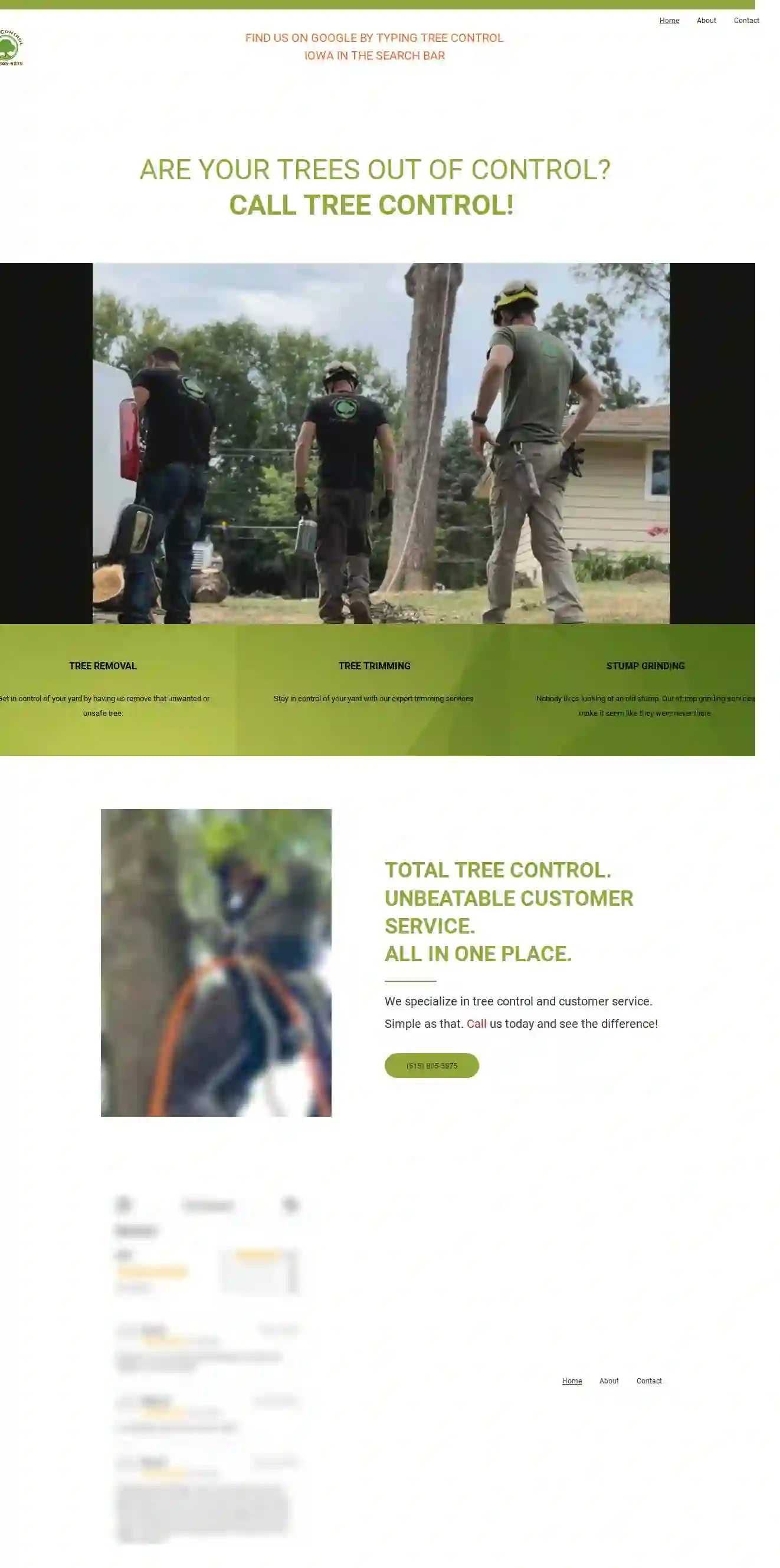
Tree Control
4.818 reviewsAmes, USTree Control Iowa specializes in tree control and customer service. We offer tree removal, tree trimming, and stump grinding services to help you maintain control of your yard. Our team is dedicated to providing unbeatable customer service.
- Services
- Why Us?
- Gallery
Get Quote
Over 16,467+ Tree Surgeons registered
Our tree service pros operate in Forest City and surrounding areas!
TreeServiceMatch has curated and vetted Top Tree Service Businesses in Forest City. Find a top & trustworthy pro today.
Frequently Asked Questions About Tree Services
- Online directories: Use reputable online directories like TreeServiceMatch to find and compare local tree service companies.
- Ask for recommendations: Seek referrals from friends, family, neighbors, or local garden centers.
- Check online reviews: Read reviews and ratings on websites like Google, Yelp, and Angie's List.
- Verify credentials: Ensure the company is licensed, insured, and employs certified arborists. You can check with your local licensing board or professional arborist associations.
- Get multiple quotes: Contact several companies for quotes and compare their pricing, services, and experience.
- Meet with potential companies: Schedule consultations with a few companies to discuss your needs, ask questions, and get a feel for their professionalism and expertise.
- Safety: Felling a tree is extremely dangerous without proper training and equipment. Falling branches or the entire tree can cause serious injury or even death.
- Property Damage: If the tree falls in the wrong direction, it could damage your home, vehicles, or other structures on your property.
- Liability: If you cause damage to your neighbor's property or injure someone while cutting down a tree yourself, you could be held liable.
- Equipment: You'll need to invest in or rent specialized equipment like chainsaws, safety gear, ropes, and potentially a wood chipper.
- Disposal: You'll be responsible for disposing of the tree debris, which can be time-consuming and expensive, especially for large trees.
- Repairs: If the tree falls incorrectly and causes damage, you'll have to cover the cost of repairs.
- Communication: The first step is to talk to your neighbor and explain the issue. They may be willing to trim the roots or remove the tree if it's causing damage.
- Root Pruning: You can cut back the roots at the property line, but it's essential to do this carefully to avoid damaging the tree. Consult with a certified arborist for guidance on proper root pruning techniques.
- Root Barrier Installation: Installing a physical barrier, such as a thick plastic sheet or metal edging, can prevent roots from growing into your yard. The barrier should be at least 2 feet deep and extend several feet from the trunk.
- Chemical Control (Not Recommended): Chemical root killers are available, but they are generally not recommended due to potential environmental damage and the risk of harming the tree.
- Significant damage or decay: If a tree has extensive damage to its trunk, roots, or branches, or shows signs of significant decay, it may be structurally unsound and pose a hazard.
- Leaning precariously: A tree leaning excessively towards a structure, power lines, or other valuable assets poses a risk of falling and causing damage.
- Disease or infestation: Trees infected with diseases or infested with pests can weaken and become hazardous. Professional assessment is needed to determine if treatment is possible or if removal is necessary.
- Root problems: Trees with damaged or compromised root systems can be unstable and pose a risk of falling. Signs include heaving soil, root exposure, or mushrooms growing at the base of the tree.
- Interfering with structures or utilities: If a tree is growing too close to a building, foundation, power lines, or other utilities, it may need to be removed to prevent damage or interference.
- Overcrowding or competition: Trees growing too close together can compete for resources, leading to stunted growth or decline. Selective removal may be necessary to improve the health of the remaining trees.
How do I find a reputable tree service near me?
Is it cheaper to cut down a tree yourself?
Risks:
Costs:
In most cases, the risks and potential costs outweigh any perceived savings from DIY tree removal. Hiring a professional tree service company is the safest and often the most cost-effective option in the long run. They have the experience, equipment, and insurance to handle the job properly and protect you from liability.
How do I stop my neighbor's tree roots from growing into my yard?
How do I know if a tree needs to be removed?
How do I find a reputable tree service near me?
- Online directories: Use reputable online directories like TreeServiceMatch to find and compare local tree service companies.
- Ask for recommendations: Seek referrals from friends, family, neighbors, or local garden centers.
- Check online reviews: Read reviews and ratings on websites like Google, Yelp, and Angie's List.
- Verify credentials: Ensure the company is licensed, insured, and employs certified arborists. You can check with your local licensing board or professional arborist associations.
- Get multiple quotes: Contact several companies for quotes and compare their pricing, services, and experience.
- Meet with potential companies: Schedule consultations with a few companies to discuss your needs, ask questions, and get a feel for their professionalism and expertise.
Is it cheaper to cut down a tree yourself?
Risks:
- Safety: Felling a tree is extremely dangerous without proper training and equipment. Falling branches or the entire tree can cause serious injury or even death.
- Property Damage: If the tree falls in the wrong direction, it could damage your home, vehicles, or other structures on your property.
- Liability: If you cause damage to your neighbor's property or injure someone while cutting down a tree yourself, you could be held liable.
Costs:
- Equipment: You'll need to invest in or rent specialized equipment like chainsaws, safety gear, ropes, and potentially a wood chipper.
- Disposal: You'll be responsible for disposing of the tree debris, which can be time-consuming and expensive, especially for large trees.
- Repairs: If the tree falls incorrectly and causes damage, you'll have to cover the cost of repairs.
In most cases, the risks and potential costs outweigh any perceived savings from DIY tree removal. Hiring a professional tree service company is the safest and often the most cost-effective option in the long run. They have the experience, equipment, and insurance to handle the job properly and protect you from liability.
How do I stop my neighbor's tree roots from growing into my yard?
- Communication: The first step is to talk to your neighbor and explain the issue. They may be willing to trim the roots or remove the tree if it's causing damage.
- Root Pruning: You can cut back the roots at the property line, but it's essential to do this carefully to avoid damaging the tree. Consult with a certified arborist for guidance on proper root pruning techniques.
- Root Barrier Installation: Installing a physical barrier, such as a thick plastic sheet or metal edging, can prevent roots from growing into your yard. The barrier should be at least 2 feet deep and extend several feet from the trunk.
- Chemical Control (Not Recommended): Chemical root killers are available, but they are generally not recommended due to potential environmental damage and the risk of harming the tree.
How do I know if a tree needs to be removed?
- Significant damage or decay: If a tree has extensive damage to its trunk, roots, or branches, or shows signs of significant decay, it may be structurally unsound and pose a hazard.
- Leaning precariously: A tree leaning excessively towards a structure, power lines, or other valuable assets poses a risk of falling and causing damage.
- Disease or infestation: Trees infected with diseases or infested with pests can weaken and become hazardous. Professional assessment is needed to determine if treatment is possible or if removal is necessary.
- Root problems: Trees with damaged or compromised root systems can be unstable and pose a risk of falling. Signs include heaving soil, root exposure, or mushrooms growing at the base of the tree.
- Interfering with structures or utilities: If a tree is growing too close to a building, foundation, power lines, or other utilities, it may need to be removed to prevent damage or interference.
- Overcrowding or competition: Trees growing too close together can compete for resources, leading to stunted growth or decline. Selective removal may be necessary to improve the health of the remaining trees.